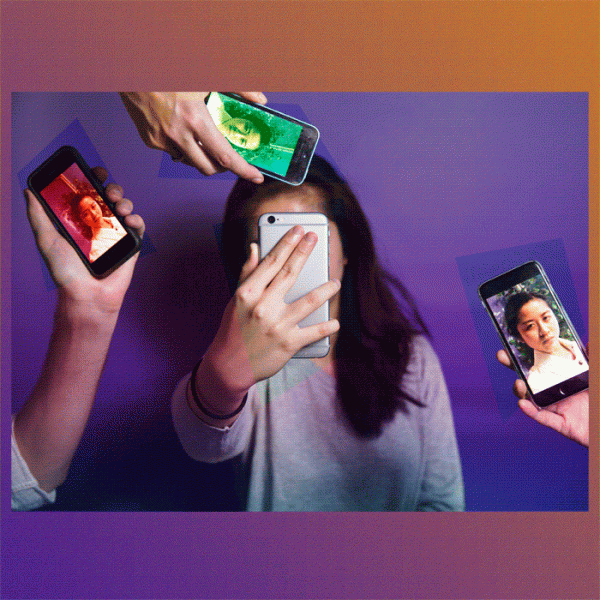It is unfortunate that with every huge invention there doesn’t come an immediate proper culture for using it, and we, as millennials, were brought up in a world that faced the most significant innovation of the century, social media. Unequipped with the right culture and knowledge to use this magical tool, the millennials experienced the heaviest damage they could take on the Internet. Fortunately, during the few past years, people and organizations have made influential moves to form the right social media culture, and there is a long road ahead of us to this end. What might concern us the most as parents now, is how to act when it comes to kids and social media.
Yes, we as the generation Y (a.k.a. millennials) and our parents, the generation X, are responsible for our generation Z and Generation Alpha children. These children are the ones whose earliest years of life have coincided with the birth of concepts such as apps, likes, shares, virtual relationships, etc.
Therefore, it is almost impossible to separate them from social media. So, when it comes to kids and social media, parents get more concerned with following or even forming an authentic social media culture, firstly for themselves, and secondly for their children.

Children are most likely to request to join the social media between the ages of 9 to 16, and these years form the period in which kids are best prepared to carry out your commands and follow your rules.
So, stop worrying about what will happen with your kids and social media and begin to think strategically. If carried out properly, your children will understand that you attempt to keep them safe and protect their privacy.
What should parents consider before their children join social media?
Before worrying about whether or not you should let your child join social media, consider these:
- What generation does your child belong to? Z or Alpha?
Although a little bit too abstract, it matters to know this fact, because they are different from us in terms of recognition and brain functioning mechanisms. Generation Z kids are those who were born between 1995 to 2010; so the youngest of these kids are now (in 2019) 9 years old. They are more risk-averse, more reasonable, logical, and self-steamed people than their parents.
Generation alpha includes kids born after 2010, so the oldest of all in this generation (in 2019) is 8. These children are brought up by millennials, who have failed the traditional marketing strategies and are blamed by many companies and businesses for their decreased annual sales!
So, the generation Alpha kids are likely to inherit the skeptic minds of their parents, and thus are less likely to be influenced easily. Knowing these facts might give parents a bit of relief regarding kids and social media safety matters.
- When should your kid get their own smartphone?
To be able to answer this question, there are some sub-questions you need to consider:
is your kid ready to take care of an expensive device such as a smartphone?
Are they in age to be immune against smartphone waves and blue light of screen? (children under ten must not be exposed to the blue light of the screen).
Are they mature enough (in terms of mind and recognition) to understand and follow the rules set by you regarding the smartphone’s usage?
Are they ready to protect their device from outdoor theft?
Are they mature enough to prevent themselves from showing their device off to their peers?
Have they ever shown addictive behaviors towards their other toys and tools?
- Is your kid ready to enter social media?
It is a question of both age and intellect. Kids gain a concrete understanding of the world between 7 to 11 years old, and they start to develop an abstract understanding of the world when they are 12. So, it means that your 7 to 11 years old kid might experience trouble understanding the abstract meaning behind social media events.
For example, when the Tide Pod Challenge was started on the Internet, mostly children under 12 participated in the challenge. The event didn’t mean to become a challenge in the first place, and it was only a joke made by an adult man. But children (and surprisingly, some few grown-ups) took the challenge seriously by eating and chewing Tide Pods, without thinking of it solely as a joke, which left many children in the emergency wards of US hospitals.
- Set rules regarding social media and smartphone usage:
Regarding social media, make your kids understand that they should only follow the ones they know in real life. You must also be a follower of your children, so you will know what they post on their pages.
Another thing to point out is that your kids must know what they shouldn’t post on their social media pages. These include personal IDs and information, their mailing and home addresses, their medical history, your future family plans, any problem they have with people and in the household, improper photos and videos and their nude images and videos.
They should also never mention the location of their posts and pictures on social media. Most importantly, you must have access to your children social media accounts usernames and passwords. About phone usage, you must tell your kids in what hours they can use it, where they can take it with them, ask them to make sure that the location service of their mobile phone is always off, and never reply to calls and messages from strangers.

Now that you have taken the preparation steps to deal with kids and social media let’s review some apps that are suitable for the use of your children.
Best social media apps for kids
In this section, we will introduce Facebook and Instagram alternatives for children.
Kudos
For: +8 kids
Platform: Android and iOS
Cost: free
Kudos is a child-friendly application that teaches children how to use social media and behave appropriately on the Internet. It is a safe photo and video sharing application that doesn’t offer any location services, so the location of your children won’t be shared with anyone. Kudos is one of the safest apps regarding kids and social media. The platform mostly focuses on spreading and teaching positive behaviors and treatments towards other kids and social media users. So, you can safely let your children enter Kudos and monitor their activities through accessibilities the app provides for parents.
PlayKids Talk
For: +7 kids
Platform: Android and iOS
Cost: free
This is a chat application in which children can send messages to their friends and family under the supervision of their parents. They can also like the messages they receive. Parents can have access to their children’s PlayKids account on their phones and monitor what is shared.
KidsWorld
For: +11 kids
Platform: Android and iOS
Cost: free
KidsWorld is a platform for children to express themselves through posting blogs and artworks. They can also play games and read blogs and articles based on what they have checked as to their interests. This is a great social media app for creative and active children.
Popham
For: +13 kids
Platform: Android and iOS
Cost: free
Kids can have their own pages and build up their community of friends and followers through creating content. They can also join groups and communities to earn new things and new languages. Moderators check all pots 24 hours a day and will stop accounts that appear to be posting and acting like spam.
Grom
For: +14 kids
Platform: Android and iOS
Cost: free
This is a place kids can experience real social media activities like getting in touch with their friends, getting help with homework, chatting, sharing photos and videos, etc. all under the supervision of their parents and the moderators of Grom.
Pros and Cons of integrating kids and social media
pros:
- Children will learn group interaction through social media;
- Social media provides online learning and education for kids;
- Kids will have ready access to news on social media and be aware of the world around;
- On social media children have the freedom to express themselves more truly;
- Kids can build a solid base of knowledge about the digital world on social media.
cons:
- Social media can offer inappropriate content to your kids;
- Bullying and getting bullied is a typical treat in social media;
- Social media is addictive and can damage the education and behavior of your children;
- Some social media contents present distorted images of reality and might deceive your kid’s perception of reality;
- Identity theft happens commonly in social media.

It’s all about forming the right social media culture…
The issue of kids and social media is about creating an authentic culture as much as it is about a parental concern. You, as parents, can’t prevent kids from getting into new worlds and experiencing. Instead, this is an excellent chance for us to take steps towards the betterment of society through teaching our children how to enhance the social media culture. It’s all about taking the right steps and believing in our children.